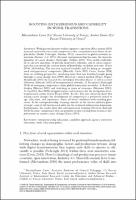Chapter Boosting Entrepreneurship Capability in Work Transitions
| dc.contributor.author | costa, massimiliano | |
| dc.contributor.author | STRANO, ANDREA | |
| dc.date.accessioned | 2022-06-01T12:08:48Z | |
| dc.date.available | 2022-06-01T12:08:48Z | |
| dc.date.issued | 2018 | |
| dc.identifier | ONIX_20220601_9788864536729_102 | |
| dc.identifier.issn | 2704-5781 | |
| dc.identifier.uri | https://library.oapen.org/handle/20.500.12657/55919 | |
| dc.description.abstract | Work personalization within cognitive capitalism (Alessandrini 2013) demands universities to certify competences that can promote new forms of employability (Boffo, Federighi, Torlone 2015), connected to global network innovation (Steiner et al. 2013). Personal entrepreneurship becomes the heuristic promoter of career changes (Federighi, Torlone 2013). This enables individuals to ask new questions, to provide innovative solutions, and to create endeavours that can extend the current limits of knowledge, or define new ones (Costa 2014). Methodology: The research analysed variables and, by doing so, strengthened entrepreneurial competence (Morselli, Costa 2015; Costa, Strano 2016) from an enabling perspective, involving more than one hundred people going through a career change (Sen 2000). Based on a mixed method (Ponce, Pagán-Maldonado 2015) the research was developed over four phases: 1) Self-assessment (Pittaway, Edwards 2012) of entrepreneurial attitudes; 2) Recognition (Federighi 2014) of emerging competences from global innovation networks; 3) Reflective thinking (Mortari 2003) and switching in terms of awareness (Mezirow 2003); 4) Capability (Sen 2006) of opportunities and resources for the instigation of entrepreneurial action (Costa Strano 2016). Results: The data observed show that during career changes the development of competences is positively linked to age, education, and experience, above all when combined with enabling processes. As for entrepreneurship, training contexts in the service industry prove strategic, even if still too focused solely on the technical-informative dimension. Furthermore, the results show that entrepreneurial training (Pittaway, Edwards 2012) becomes competence that can promote action starting from resources/opportunities in various career changes (Costa 2014) | |
| dc.language | English | |
| dc.relation.ispartofseries | Studies on Adult Learning and Education | |
| dc.subject.other | entrepreneurship education | |
| dc.subject.other | capability approach | |
| dc.subject.other | agency | |
| dc.subject.other | university education | |
| dc.subject.other | work | |
| dc.subject.other | education policy | |
| dc.title | Chapter Boosting Entrepreneurship Capability in Work Transitions | |
| dc.type | chapter | |
| oapen.identifier.doi | 10.36253/978-88-6453-672-9.43 | |
| oapen.relation.isPublishedBy | bf65d21a-78e5-4ba2-983a-dbfa90962870 | |
| oapen.relation.isbn | 9788864536729 | |
| oapen.series.number | 8 | |
| oapen.pages | 10 | |
| oapen.place.publication | Florence |

